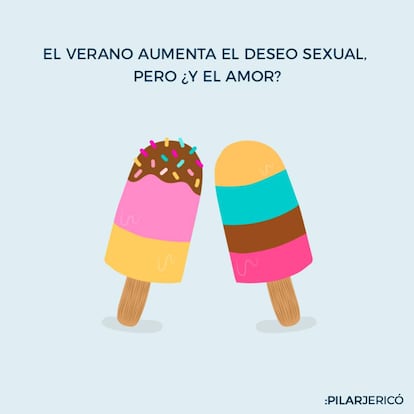Summer means a boost in sexual desire, but what about love?
With warmer weather and longer days hormone levels rise, but does romance come in to it?
Summer has arrived, and with it, an increase in physical attraction and crushes. The reason is to do with the greater number of hours of sunshine and with our overactive hormones. But is there more love to go around too?

Our body’s chemistry varies throughout the year, and in summer all that is related to sexual attraction and crushes is activated. At least that is the conclusion of the expert Helen Fisher, a professor at Rutgers University in New Jersey, and who made the theory fashionable several years ago with her book Why We Love: The Nature and Chemistry of Romantic Love.
Days are longer, and seduction is rife at parties, on beaches and during all kinds of social events
According to this biologist and anthropologist, testosterone is one of the protagonists in the world of sexual attraction, and it reaches its critical point in the summer. The reason? The days are longer. As such, seduction is rife at parties, on beaches and during all kinds of social events. The climate helps too. But it’s not just testosterone that’s affected: serotonin and pheromones are too.
Serotonin, the neurotransmitter that influences pleasure, is most active in the summer. And pheromones, the substance that we give off via our skin and that act as a sexual attractor, are more exposed in the hotter months. As such, it’s no surprise that the summer “does its job” and that May has traditionally been the month that has seen the most births in Spain.
But while chemistry is behind our sexual desire, this cannot be confused with romantic love or with the need for bonding, or establishing stable links with a person. Of course they are related, but they are different – even when it comes to the impact on our cerebral mechanisms.
While chemistry is behind our sexual desire, this cannot be confused with romantic love or with the need for bonding
Romantic love awakens areas of the brain that are linked to attention, to learning and to reward (“I’ll stop wasting time on flirting to focus on who is important to me,” is a simple way of summing it up). The experience of love is something more than an emotion or a chemical response. It is related to profound decisions and motivations, which activate other parts of our brains, such as the ventral tegmental area (VTA). As such, we could say that love is in the brain and that it is an even stronger impulse than sex.
As Fisher explains: “If you ask someone to go to bed with you and they reject you, you don’t enter into a depression, nor do you commit suicide, nor do you kill anyone; but people do suffer terribly, and can do these things, after a romantic relationship ends.”
Without a doubt, the summer leads to a greater predisposition for sexual attraction and crushes. Our hormones, neurotransmitters and chemical substances help this to happen. And it’s fun and exciting. In fact, practically all of the summer hit songs are based on this experience, as is happening right now with the song Despacito. But this is something different to love or bonding. It depends on the motivation of the person and their deepest desires. Therefore, in summer we should enjoy the good moments that we can, knowing that romantic love belongs to another section of our brains.
English version by Simon Hunter.
Tu suscripción se está usando en otro dispositivo
¿Quieres añadir otro usuario a tu suscripción?
Si continúas leyendo en este dispositivo, no se podrá leer en el otro.
FlechaTu suscripción se está usando en otro dispositivo y solo puedes acceder a EL PAÍS desde un dispositivo a la vez.
Si quieres compartir tu cuenta, cambia tu suscripción a la modalidad Premium, así podrás añadir otro usuario. Cada uno accederá con su propia cuenta de email, lo que os permitirá personalizar vuestra experiencia en EL PAÍS.
¿Tienes una suscripción de empresa? Accede aquí para contratar más cuentas.
En el caso de no saber quién está usando tu cuenta, te recomendamos cambiar tu contraseña aquí.
Si decides continuar compartiendo tu cuenta, este mensaje se mostrará en tu dispositivo y en el de la otra persona que está usando tu cuenta de forma indefinida, afectando a tu experiencia de lectura. Puedes consultar aquí los términos y condiciones de la suscripción digital.








































